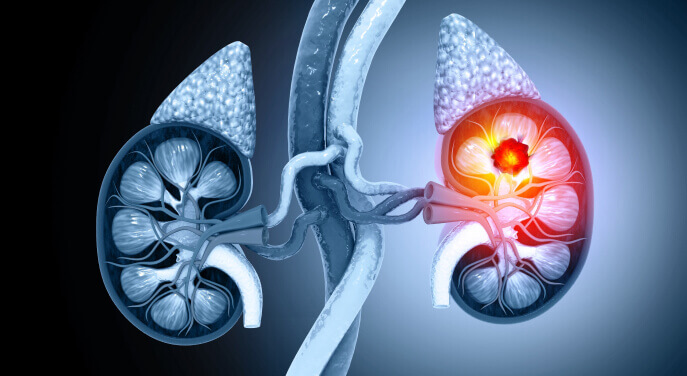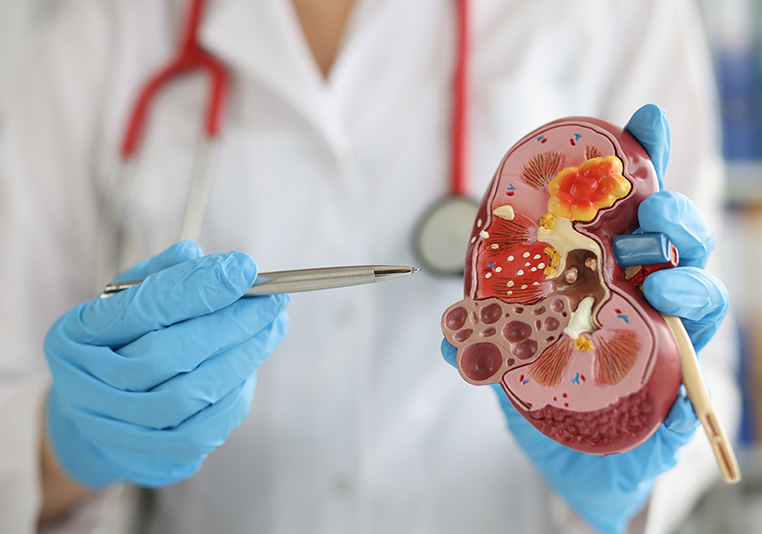Kidney Cancer
Kidney Cancer
Kidney cancer accounts for about 1-2% of cancers in Singapore. Like most types of cancer, it is treatable if detected and managed in its early stages. Kidney cancer treatments may include surgery, immunotherapy, chemotherapy, and more, depending on the stage and severity of the cancer.

Dr Michael Wong, Medical Director & Senior Consultant Urologist
FAMS (Urology), FICS (USA), FRCS (Edinburgh), M Med (Surgery), MBBS (Singapore)

What Is Kidney Cancer?
Kidney cancer is a type of cancer that originates in the

What Are The
Signs and Symptoms of Kidney Cancer?
Kidney cancer usually does not exhibit any symptoms during its early stages. In the later stages, signs and symptoms of kidney cancer may include:

Blood in the urine

Fatigue

Lower back or side pain and discomfort

Abdominal mass or lump

Unexplained weight loss

Fever
If you are experiencing these signs and symptoms, consult our kidney cancer specialist for a personalised diagnosis and treatment.
What Are The
Types of Kidney Cancers?
Kidney cancer can be classified into several types, including:
Renal cell carcinoma
This is the most common type of kidney cancer that accounts for approximately 85–90% of all diagnoses.
Urothelial carcinoma
Known as transitional cell carcinoma, this occurs in the renal pelvis, a funnel-shaped area where urine is collected before it is transmitted to the bladder.
Wilms tumour
Also called nephroblastoma, Wilms tumour is a type of kidney cancer that commonly develops in children. The condition usually affects children between the ages of 3 and 4 years old.
Renal sarcoma
This is a rare type of kidney cancer characterised by the development of cancerous cells in the blood vessels or connective tissues of the kidney.
Early detection leads to better treatment options and outcomes.
If you are experiencing potential kidney cancer symptoms, schedule a consultation with our urologist at +65 6838 1212.

What Causes Kidney Cancer?
Cancer of the kidney has no specific known cause. A number of risk factors, however, contribute to an increased likelihood of developing the disease. These include:

Smoking

Certain genetics conditions

High blood pressure

Family history of kidney cancer

Obesity

Long-term use of certain medications
How Is Kidney Cancer Detected?
In order to diagnose kidney cancer, a kidney cancer clinic performs a number of tests and procedures, including the following:
Ultrasound or Computed Tomography (CT) scan
An imaging test can provide detailed images of the kidneys and determine the extent and characteristics of a kidney tumour.
Kidney biopsy
To detect signs of kidney cancer, a thin needle may be inserted into the kidney to obtain a sample of cells for laboratory analysis.
Cystoscopy
By inserting a thin, flexible tube with a lens and light called a cystoscope, the doctor can examine the urethra, prostate, and bladder in real time to detect blood in the urine and kidney cancer.
What Are The
Treatments for Kidney Cancer?
Kidney cancer treatment often starts with surgery to remove the cancer, particularly when it is localised. Depending on the type of cancer and tumour extent, treatments include:

Surgery
Surgery is initially meant to remove the tumour while maintaining the functionality of the kidneys. In advanced stages, it may be necessary to partially or entirely remove the kidneys. Ultimately, there are different types of kidney cancer surgery, depending on the extent of the cancer.
Radiofrequency ablation
This uses electric currents to destroy cancerous cells via the insertion of a needle through the skin and into the kidney tumour.
Active surveillance
In mild cases, this simply involves regular imaging to monitor the development of kidney tumours.
Chemotherapy
This uses anti-cancer medications administered through the mouth or a vein (IV).
Immunotherapy
Certain medications are given to boost the immune system in order to aid the body in identifying and fighting off cancerous cells.

Are There Any Risks In
Undergoing Kidney Surgery?
Kidney surgery carries the following risks:

Formation of blood clots and bleeding

Unsuccessful or rejected donated kidney

Blockage or leakage of the ureter

Infection
However, when in the hands of an experienced
Let us help you
Restore your urological health.
Make an appointment with Dr Michael Wong to receive a tailored, supportive and targeted care plan.
Office
Location
3 Mount Elizabeth Road, #10-09,
Mount Elizabeth Medical Centre,
Singapore 228510
Contact
Number
| Tel | |
| Tel | |
| Fax | : (65) 6838 1216 |
| 24-hour answering service |
Email
Address
Opening
Hours
Mon-Fri | : 9:00am - 1:00pm |
Sat | : 9:00am - 12:00pm |
Sun/PH | : Closed |
Blog





